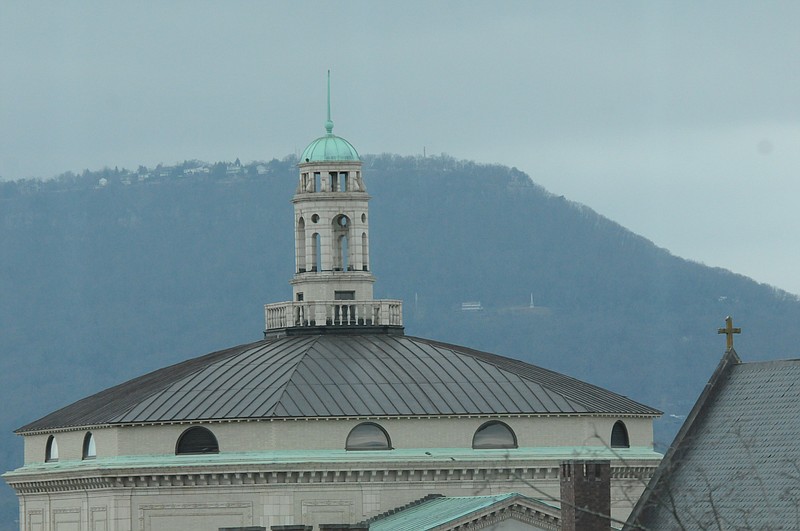For 105 years, First Presbyterian Church has preached the good news of Jesus Christ from the corner of McCallie Avenue and Douglas Street. But there were four other corners before that where Chattanooga's oldest congregation gathered for worship.
First Presbyterian will observe its 175th anniversary on June 21. It is the oldest organization of any kind in Chattanooga, according to several notable historians.
Correction
The author of last week's Local History installment, titled "Marker commemorates Beck family legacy," should have been identified as LaVonne Jolley.
Remarkably, the church has had only 13 pastors, two of which -- Dr. Jonathan W. Bachman (50 years) and Dr. James L. Fowle (38 years), were designated "city chaplain.'' They were very active in church planting, making First Presbyterian the mother of numerous local Presbyterian bodies.
Two missionaries to Brainerd Mission, which existed from 1817 to 1838, organized the church after The Trail of Tears removed the Cherokee Indians. There were 28 founding members.
The first corner of worship was Fifth and Lookout streets, where a log cabin served as the community meeting place. The name Chattanooga was chosen in that structure, and the first school was conducted there.
The growing village actually gave plots of land to churches, with the first going to "the Presbyterian Church of Chattanooga.'' So the congregation's second corner was at Third and Walnut streets. The first Chattanooga building erected expressly for worship was 60 feet by 30 feet. Blacks were welcome and other denominations were allowed its use.
As the town grew southward from the Tennessee River, the Presbyterians moved, too. A larger edifice was erected at Seventh and Market streets, the worshippers' third corner. That's where one of the nation's notable pastors was a guest on Aug. 21, 1863, "a day of fasting and prayer'' proclaimed by Confederate President Jefferson Davis.
Yankee cannon fire from Stringer's Ridge flew over and subsequently hit the building while Rev. Benjamin Morgan Palmer was praying the "long pastoral prayer.'' As parishioners fled, Dr. Palmer continued and completed his prayer to look up and see that it had been heard only by God. A few weeks later the building was stripped to become a Union Army hospital.
Pastor Thomas Hooke McCallie then held services in the family home at what became McCallie Avenue and Lindsay Street. He was the only pastor who stayed in the town during the War Between the States. With blue-coated soldiers present, he regularly prayed for the soldiers in gray. He was arrested. Upon discharge, he resumed praying for the young Rebs.
After 11 years of war and Reconstruction, the worn-down preacher yielded his pulpit and former Confederate Capt. Bachman filled it. During his half century of service he saw the town become a great city as he ministered during yellow fever, floods, World War I and peacetime. He was nationally known for uniting Union and Confederate veterans.
When Northern-minded Presbyterians decided to split off and start Second Presbyterian in 1871, the Presbyterian Church of Chattanooga took on the name "First.'' Not long afterward, one of the church's elders built and installed the city's first pipe organ. That instrument was moved in 1884 to the church's fourth corner -- Seventh Street and Georgia Avenue -- where the first upscale church architecture in the city was employed. Catholics, Cumberland Presbyterians, Baptists and Northern and Southern Methodists soon built nearby.
A quarter of a century later, a burgeoning congregation needing a larger facility, built and entered the current sanctuary in 1910. Dr. Bachman, living catty-corner on McCallie, could watch the construction. The Bachman Tubes honor his citywide ministry.
The next pastor, Dr. Joseph G. Venable, preached the first local sermons over radio. That has continued uninterrupted since 1926 and is believed to be the longest-running radio program in history.
Successor Dr. Fowle was noted for fundraising for many Christian, civic, medical and educational causes. He was a founder and president of the Chattanooga Bible Institute.
Next, Pastor Ben Haden, through the medium of television, is believed to have reached more people across the globe with the claims of Christ than anyone else in Chattanooga history.
Older churches' members have early and ongoing opportunities to influence their community. A First Presbyterian elder started the city's first Sunday school; another brought Scouting here; another brought the Fellowship of Christian Athletes; another started Chattanooga Prison and Prevention Ministry; an assistant pastor was the first head of the Community Chest (United Way) and another pastor led it through the Depression; a women's group led in founding the Children's Home; lay men and women started the city's three major banks and founded Baylor, McCallie, GPS and Bright schools; and two of the three founders of Bible in the Public Schools were members.
Thousands of others have been salt and light emanating from First Presbyterian's "five corners for Christ.''
David Cooper is former news editor of the Chattanooga Times Free Press and author of First Presbyterian's history, "Catalyst for Christ." For more, visit chattahistoricalassoc.org or call LaVonne Jolley at 423-886-2090.
